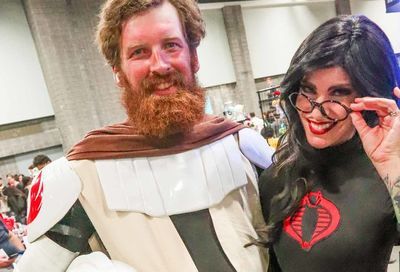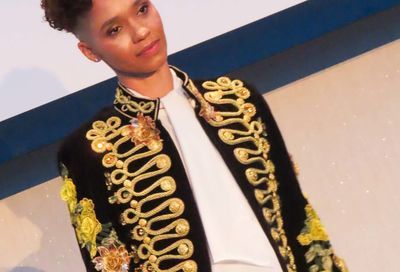Exclusive Photos: The cast of Studio Theatre’s “Wig Out!”
Studio Theatre enters the world of LGBTQ ballroom culture with a thrilling, immersive production of Tarell Alvin McCraney's poetic masterpiece Wig Out!

“We began working on Wig Out! ten years ago,” says director Kent Gash, a friend and frequent collaborator to Tarell Alvin McCraney. “Early on, it was considered a very fringe kind of play, a very outside kind of play. And because it had a large cast of color, it was a play that a lot of theaters wouldn’t do.”
A decade makes all the difference in the world. As does an Academy Award. McCraney, who recently took over the post as chair of playwriting at the storied Yale School of Drama, was awarded an Oscar for co-writing the screenplay for Moonlight, which also took home the 2016 Academy Award for Best Picture.
“We’re in a different place now,” says Gash, following Sunday’s afternoon press opening of Wig Out! at Studio Theatre (see review, page 33). “We’re in a different moment. The entire culture, and certainly America, has begun to wrestle with the idea of binary gender identity and cisgender versus the gender that you truly feel you are. The struggle to be one’s authentic self is probably the greatest of all human struggles. And Tarell so eloquently and so artfully dramatizes the need for that. The essential human needs that drive most great plays are right in the center of this play.”
Article continues below…
Check out our exclusive images of the cast of Wig Out!
Swipe through to view the photos:
[masterslider id=”6″]
Set amidst the voguing, competitively charged underground drag ball world, Wig Out! is a supremely layered work. The core narrative deals with romance, betrayal, loss, and the need for fabricating a family out of circumstance. Over that, McCraney layers the kind of poetics that evoke Greek drama. Few writers are as gifted at combining the grit and harshness of reality with fanciful flights of imagination. And yet the results — particularly an immersive, in-your-face production at Studio directed by Gash and brilliantly choreographed by Dell Howlett — are nothing short of exhilarating. Gash evokes energized, nuanced performances from a multi-talented cast — a cast required to act, sing, dance, lip-sync, and throw almost perpetual shade at one another. And then there is the matter of McCraney’s verbiage. The playwright, oft compared to August Wilson, is closer in kinship to William Shakespeare, such is his glorious, eloquent mastery of the poetics of modern language. He is at once grounded and accessible and theatrically stratospheric.
“It’s very like Shakespeare,” says Gash. “Tarell and I talk a lot about that the plays have Elizabethan bones. They really rise and fall in part on their language. The actors have to have great language facility, but they also have to know how to be real and honest even when the language is heightened or poetic.”
Gash, who last helmed McCraney’s Choir Boy at Studio, has a long relationship with the playwright. He also had the good fortune to work with the legendary August Wilson.
“I directed some of August Wilson’s work while he was still alive,” says the grey-bearded Gash, a handsome, youthful 57. He wears a crisply-pressed, bright red “Incredibles” t-shirt. A small bone earring protrudes from his left ear, a celebration of both style and African-American heritage. “There were two things that August always said that I’ve never forgotten. He said, ‘My plays are about people that nobody else puts on stage.’ And he said, ‘I wanted to write a play for every decade in our history about us because that actually doesn’t exist and it should, because all the stories of ours that don’t get told, every time we see something that we’re not included in or we’re not a part of, the implication is that either we don’t exist or our existence is not important enough to make art about.’ August did something that never existed before, and Tarell has continued to do the same.”
He clarifies his point. “I said this to the cast today: the scenes that they’re playing in Wig Out! don’t exist anywhere else. There are no other plays that deal with African-American intimacy between two men, and in particular between one man who’s not gender defining…. No one else is writing those scenes and those plays for men of color. No one else is writing this way about the LGBTQ community.”
The show’s success rides not only on its words, but on its movement. And for that the 37-year-old, Richmond, Va.-raised Howlett, has taken the 11-person cast and created an electrifying event, particular during the second act ball that is nothing short of breathtaking. The voguing is both deliberate and spontaneous. It’s a character in its own right.
“Voguing is the perfect balance of improvisational, creative movement and technique,” says Howlett. “There’s structure to it. And form. The people who are masters of it have studied it and worked on their craft like any good artist…. I think that’s a part of what popular culture is beginning to understand. The idea of vogue came out of a kind of fascination with fashion, and a lot of the structures within vogue culture are based on fashion, but it’s evolved into a more aggressive form, it’s evolved into a more rhythmic form. It’s taken things from popular culture and remixed them, become something wholly original.”
“There’s a deeper metaphorical thing happening in the movement because it is symbolic of our need to carve out a space and define it on our own terms,” adds Gash. “These are characters that have to carve out a place to be. A place to belong. And a place to be wholly authentic — which includes physically authentic, sexually authentic, honoring whatever your sexual impulses are.”
The director and choreographer, along with a few members of the Wig Out! cast, will reunite in D.C. come Spring of 2018 for The Wiz at Ford’s Theatre.
“It was the first great African-American musical that was not about any kind of suffering,” says Gash of the 1975 original Broadway production. “It was the first great African-American musical and…was the greatest celebration of black excellence, of black style, that Broadway had ever seen…. People see black faces on stage and think, ‘Oh, that’s a black musical.’ But The Wiz was a black musical with a score by an African-American composer and lyricist, and that matters. A black director and choreographer, a black costume designer, a black orchestrator. Hopefully, at Ford’s, we can capture some of that lightning in a bottle and celebrate black excellence, celebrate black style, and celebrate the great D.C., Baltimore and Virginia talent pool.”
For now, however, the focus is squarely on Wig Out! and on bringing works created by McCraney into the broader American spotlight.
“Any theater that commits to producing the work of Tarell Alvin McCraney deserves my attention,” Gash says of Studio, which has become such a national home base for McCraney’s plays, that the author himself flew in to attend Sunday’s press opening. “Any time I can tell a story that Tarell has written, a story that’s about the many communities that I’m a part of, as a black man, as a gay man — any time I get the opportunity to do that, I show up because those opportunities don’t come very often.”
Still, the opportunities are arising more frequently, across the nation, in its regional theaters.
“Here’s the good news,” Gash smiles. “August Wilson is the most produced playwright in America as of this year. That’s fantastic. Fantastic. And I think that one of the things Moonlight and its success did is that [theaters] are now going, ‘We didn’t really know if we could do Tarell’s plays, but now we can advertise him as an Academy Award-winning playwright, so maybe we can take a chance.’ It’s interesting because so many of Tarell’s plays intersect both the community of color and the LGBTQ community in unique ways.
“That’s still a risk factor for a lot of theaters,” he concludes. “There are theaters who think, ‘I am not sure if I could produce that or not.’ I’m hoping that with every production, that hesitancy is being eroded. That the brilliance of his work is really coming to the fore. And the great thing is that every single one of his plays is a really singular and indelible adventure. All theaters should be taking that journey.”
Wig Out! runs to August 6, at Studio Theatre, 1501 14th St. NW. Tickets are $20 to $55. Call 202-332-3300, or visit StudioTheatre.org.
Support Metro Weekly’s Journalism
These are challenging times for news organizations. And yet it’s crucial we stay active and provide vital resources and information to both our local readers and the world. So won’t you please take a moment and consider supporting Metro Weekly with a membership? For as little as $5 a month, you can help ensure Metro Weekly magazine and MetroWeekly.com remain free, viable resources as we provide the best, most diverse, culturally-resonant LGBTQ coverage in both the D.C. region and around the world. Memberships come with exclusive perks and discounts, your own personal digital delivery of each week’s magazine (and an archive), access to our Member's Lounge when it launches this fall, and exclusive members-only items like Metro Weekly Membership Mugs and Tote Bags! Check out all our membership levels here and please join us today!





















You must be logged in to post a comment.